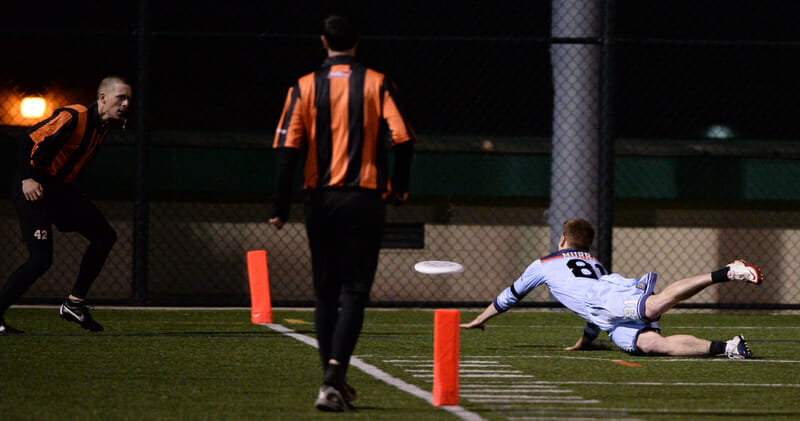June 13, 2013 by Charlie Eisenhood in Analysis, Opinion with 35 comments

When the American Ultimate Disc League began last year, it marked a milestone in ultimate. For the first time in the sport’s “modern” history, a fully fledged league would be officiated by third-party referees. In a sport built around the concept of the Spirit of the Game and self-officiation, the move was controversial — and remains so to this day.
Most of the criticism of referees centers around the idea that it will increase the amount of cheating in the game, as players look to get away with holding, picks, marking fouls, and other various infractions that help the defense. There are plenty of arguments on both sides of the debate that have been endlessly hashed out.
Despite the debate, the AUDL and Major League Ultimate, the two competing professional leagues in the United States, have consistently agreed that referees are necessary for a professional version of the sport. However, right now, their implementation of referees is ruining the game.
Watch almost any pro game from either league: you are likely to see more than a handful of blown calls, some so egregiously bad that you can hardly believe they missed it. Picks are commonplace and almost never called. Hacks on the mark are almost becoming a part of the game; it would not be a surprise to find out that players are practicing throwing through hard fouls.
Whether it is a training issue, a league-wide policy of avoiding foul calls to “improve” the flow of the game, or simply poor referees, the leagues need to get a handle on the problem. Countless times during a match, a player will pivot to throw a short dump and they will be slashed by the defender’s hand, knocking the throw out of rhythm and creating a turnover. More often than not, it goes uncalled.
Consider a basketball game in which jump shooters were consistently having their elbows bumped on their release and the refs were never calling a foul. The game would be a mockery! Referees call that foul extremely tight to deter players from making the game essentially unplayable — if you get your arm bumped while you’re shooting, you’ll never make a basket.
It’s the same way in Ultimate. The referees have to start enforcing a much stricter marking policy, punishing contact more swiftly, in order for the game to be played fairly. Stop worrying so much about stoppages ruining the game. Every sport has fouls and breaks in the action — people are more likely to be turned off of the sport by egregious fouls going uncalled than for a five second penalty stoppage.
As referees fail to establish themselves as likely to whistle a hack, the games often get more foul-heavy as they go along. The problem hasn’t gotten any better. At the two pro games in New York this weekend, the refereeing was abysmal. In Major League Ultimate’s DC Current v. New York Rumble game, the game went to overtime after two players hit the Current’s Jeff Wodatch on a throw with time winding down in the 4th quarter. The referee, standing just feet away, made no call. After the game, the Rumble players admitted to fouling him and even tried to overturn the call in the moment!
The AUDL game wasn’t any better. Blatant marking fouls, easily spotted from way up in the press box, were simply allowed to continue throughout the game.
Players around the leagues have mixed reactions to playing with the poor refereeing. Some prefer the more physical game and like to play through the contact; others think that the officials are ruining the game. It doesn’t have to be a black and white choice. If the referees start enforcing the rules of the game and leaning more heavily on the whistles, the game will clean up as a result. That doesn’t mean they need to call bumping in the stack or stop the game for a light foul after a reception before the player has set up to throw. But the fouls that are affecting the outcome of plays — hacks on the mark, big picks downfield — have got to go.
If this is a policy issue, it can change today. The leagues can tell referees to start pulling out their whistles more.
If this is a training issue, it likely won’t be fixed until next season. Top league administrators need to watch the game footage coming out each week and start to come up with a plan to train the referees on what to watch for and how to call a game. Referees are always going to miss some calls, but they can be doing a far better job.
If they can’t figure it out, maybe the pro leagues should just use observers.